By: SHAILESH SOLANKI and BARNIE CHOUDHURY
Conservatives will take bold actions to crackdown on rising retail crime as well as to strengthen the backbone of Britain’s economy, prime minister Rishi Sunak has said as he called on Brits for their support ahead of General Elections on July 4.
Speaking exclusively to Eastern Eye, a publication of Asian Media Group (the house of Asian Trader), the prime minister declared that fighting retail crime is very much on his priority list and he will continue taking bold steps to protect shop workers against abuse.
He said, “Anti-social behaviour and crimes such as shoplifting are a blight on our communities and scourge for local businesses. That’s why as PM, I have launched plans to tackle anti-social behaviour plan and fight retail crime plan.
“On anti-social behaviour, we have toughened up the police response to drugs and expanded testing on arrest, banned nitrous oxide, will make perpetrators repair the damage they cause and are targeting policing in hotspot areas. The plan is working with anti-social behaviour down by half in some pilot areas and we are now rolling the plan out nationwide.”
In April this year, the Conservative-led government has announced that assaulting a retail worker will be made a standalone criminal offence under which those found guilty could be sent to prison for up to six months, receive an unlimited fine and be banned from going back to the shop where they committed the crimes.
Alongside these measures introduced by Sunak, the serial offenders will be required to wear tags to track their movements. There will also be increased use of facial recognition technology to help combat crime on high streets and other public spaces.
The new measures were included in the Criminal Justice Bill amendment though they could not be put into action due to the announcement of the Election date.
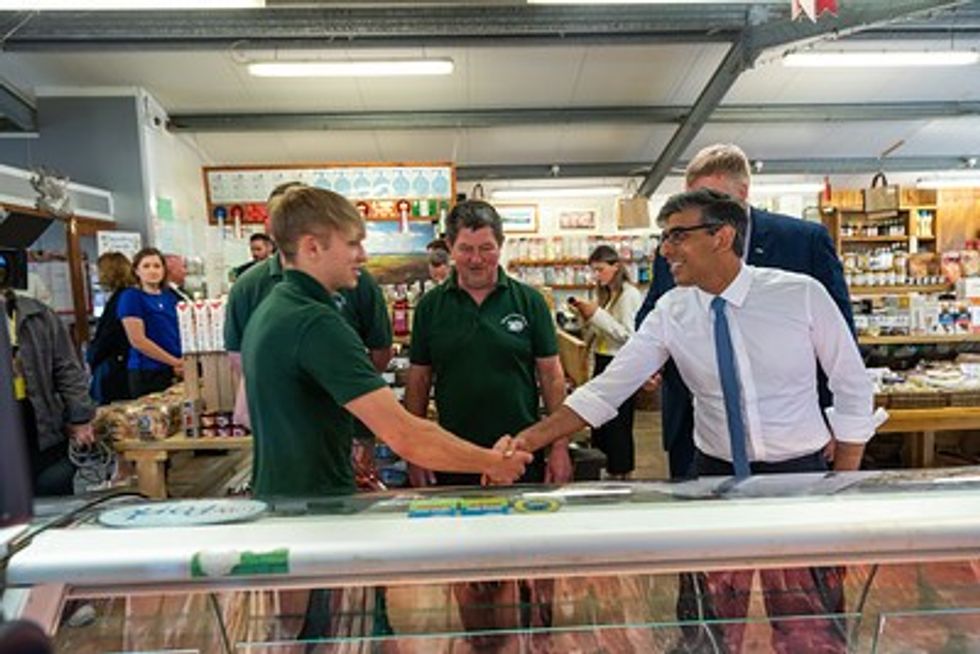
During the exclusive conversation with Shailesh Solanki, executive editor of Asian Media Group, Sunak once again made clear that the Conservative party, if it comes to power, will make sure to bring forward the changes proposed in the last term.
“On shoplifting, we will create a new standalone offence of assaulting a retail worker, introduce electronic tagging for violent behaviour or serial shoplifting and making more use of facial recognition to catch suspects.
“Since 2010, we have recruited 20,000 new police officers since 2019, and we will go further by recruiting 8,000 new full-time police officers with full power of arrest as part of a new neighbourhood policing programme.”
Sunak reminded the voters that Labour has “no plan to tackle crime”.
“Crime is down since the Conservatives came to power and we will continue to take bold action to protect shopkeepers and local communities and make our streets safer. Labour have no plan to tackle crime and would take us back to square one,” he said.
The Prime Minister was on a visit to the Shree Kutch Satsang Swaminarayan Temple in Harrow, in northwest London, when he also talkedin detail about his ideas, future plans, background as well as faith, saying Hindu "dharma" (sense of duty) drove him to accept the most challenging job in the UK.
“I was raised with values of service to your community and particularly dharma as you'll understand it,” said Sunak.
“It's about doing one's duty, and that's how I approach this job. I'm so grateful to everything that this country has done for me and my family, and that's why I love it, and I work very hard in this job to try and help other people.
“That philosophy gives me a sense that, even when things are difficult, of which there are plenty of difficult times in this job, having something that you can kind of anchor with, get support and courage from, and strength and resilience from, is really important.
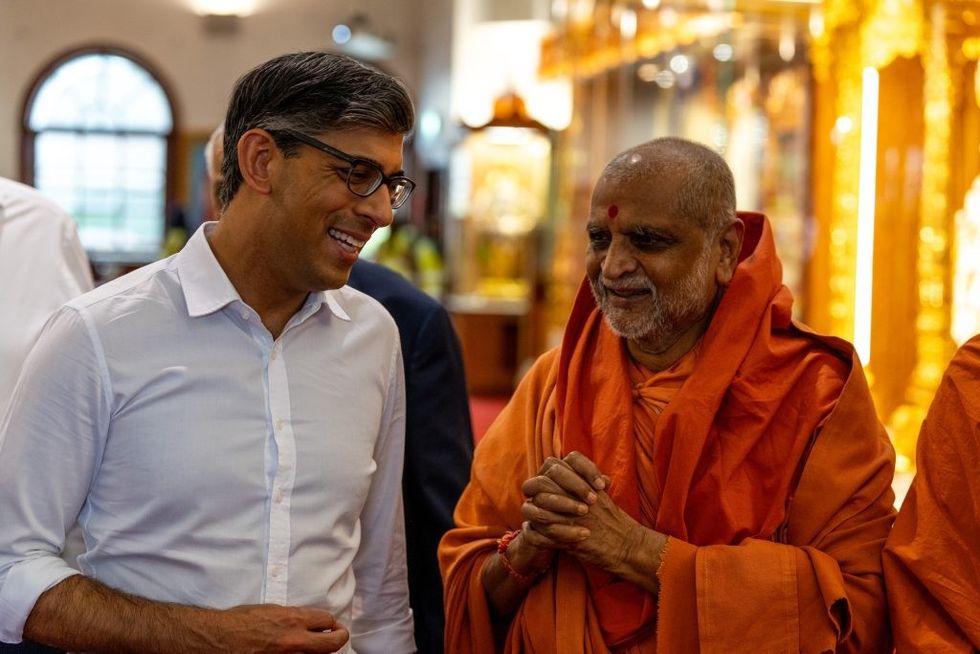
“It teaches me to work as hard as I can, do what I believe is right, and try and not get as fixated on the outcome, because I've got to focus on doing what I think is right, and putting as much into it as I can, and doing my duty right, and even if it's difficult, that's what I'm here to do," he said.
Sunak also explained how his sense of duty and serving communities came from his childhood.
He said, “I was really lucky, because I was raised in a very loving home and very supportive family. I think family is probably the most important thing in all of our lives, and that's something I think governments don't always talk about.
“I'm happy to talk about it because I think it is important, but I was also raised with the values of hard work and service and for us, serving the community in different ways was very important to my parents, both in their jobs as pharmacist and GP.
“They went above and beyond to really look after people that they were responsible for and had a duty to. But also, whether it was at the mandir or other things, that was instilled in us that you have to spend your time helping other people in your community in lots of different ways.”
“You don't get anywhere in life without hard work, you have to work hard for what you want.”
The prime minister took over leading the country and his party at a time when Britain’s economy went into a tailspin caused by his predecessor, Liz Truss. Her mini budget included £45billion of unfunded tax cuts, which led to Truss’ downfall and promoted her resignation after 49 days.
In 2022, during the Tory party leadership contest, Sunak warned members that his opponent’s tax cut plans would “tip millions of people into misery”. The markets panicked and sterling hit a record low.
Even so, Sunak said he had no choice but to accept responsibility to guide his country to a better future.
He recalled, “It was clearly going to be very difficult that wasn't me [saying it], someone else described it as the worst hospital pass (someone put in a difficult or unpleasant situation) for any incoming prime minister.
“But I didn't feel I had any choice, I felt it was my duty, given what I said over the summer about the economy, and that's what I focused on. Then making sure we restore that economic stability, which we have now done, 11 per cent inflation now back on target, the economy growing faster than our competitors, wages rising, interest rates on the verge of being cut.
“So, I think we have on the thing that was most important, really made good progress,” he said.
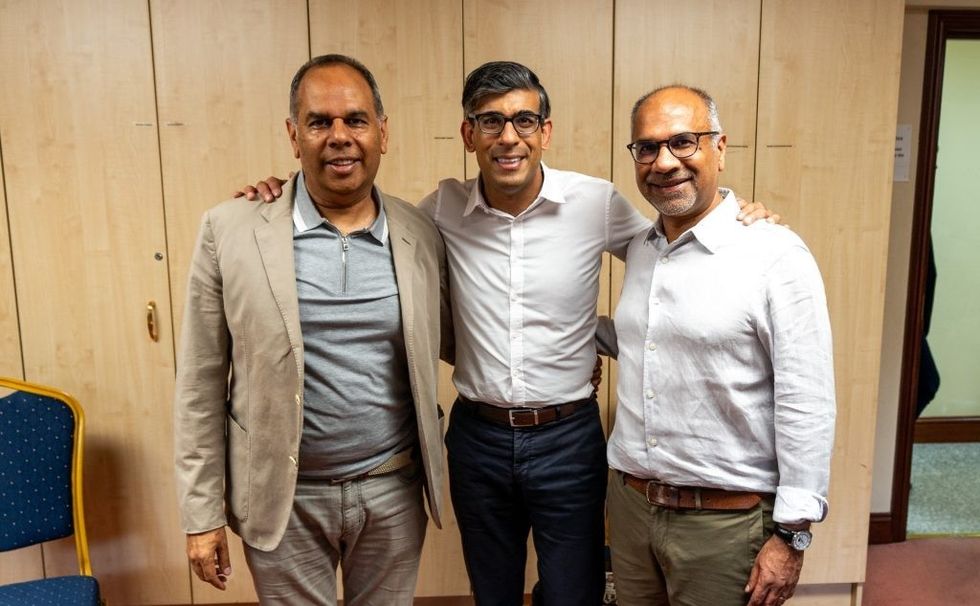
It was Conservative MPs who elected Sunak as their party leader, after Penny Mordaunt and former prime minister, Boris Johnson, dropped out of the contest in October 2022. In doing so, he became the first PM of south Asian heritage to occupy Number 10.
The mantle of office, he admitted, weighed heavily.
“I feel an extra sense of responsibility, because I know lots of people are looking up to me and being the first at something, it does come with that,” said Sunak.
“I don't want to let people down, and I want to do a good job for everyone, but you do have that extra kind of mantle of responsibility, a lot of people are looking up to me to do a good job. So, you try and do the best you can.”
Sunak added that while his faith guided him, he did rely on the support of his wife, Akshata, daughter of the Indian tech-billionaire, Narayana Murthy.
“Akshata is an incredible support to me and provides a lot of strength and support [during] a lot of difficult times. And my girls are great because they're young, and largely what I do doesn't bother them, and they're not that focused on it, because they're still little enough, which is great.
“What they are is a wonderful distraction away from it all, because they're more interested in their games, or what they're playing, and what they're watching on tele, or their hobbies.
“I don't see them as much, I [don’t] get to spend as much time with them, but when I do, it is a nice switch off and [get] a break from everything else, because they're just young enough that this is not something that they're worried about. They're not sitting there watching the six o'clock news or debates, things like that.”
Speaking about his stance on immigration, the Prime Minister said that he was “living proof of how tolerant and compassionate our country is”.
“We were welcomed into this country, and I've always said ours is a country where if you come here and you're willing to work hard, integrate and share a set of common values, the sky's the limit for what you can achieve, and I'm living proof of that.
“That's something we should celebrate, we're the most successful multiethnic, multi faith democracy anywhere in the world. That should be a source of enormous pride for us. But I do think that that success would be put at risk if we are not able to demonstrate to everybody that we are in control of the levels of immigration, and the levels over the past few years have just simply been too high.
“It's right that they come back down to more sustainable levels, because that eases pressure on public services. We need to make sure that we're reforming our welfare system here at home, so that we can support people into work. When we've got so many people on the welfare system, particularly since the pandemic, that with the right support, they can work.”
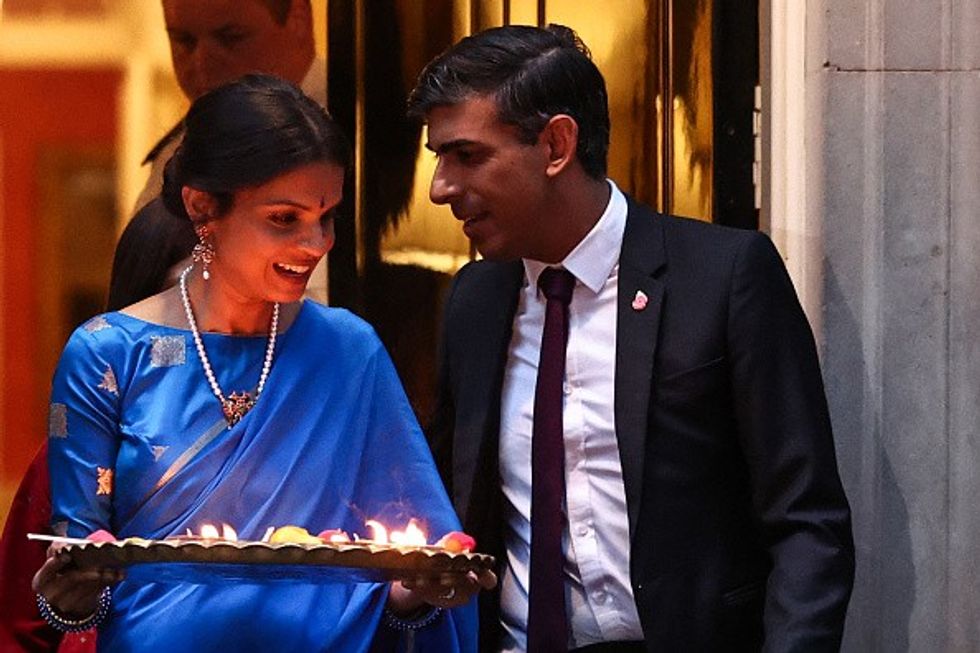
On being questioned whether we should celebrate more the contribution of communities of colour, Sunak explained, “I think in one sense, it's big deal that I'm first British-Asian prime minister. But in one sense, it was not a big deal, and I think that that is a good thing in the sense that because people think that it’s just something which is British.
“I think that is a positive thing, in a way, because it is perceived as something that is perfectly reasonable and possible in this country, and I think that is a good thing.
“But of course, we constantly need to make progress, as every country does, and just making sure that we are a tolerant country where everyone, regardless of their background, not just ethnic or religious background, is getting the opportunities that they deserve to live a fulfilling life.”
Sunak was equally clear that he could and would continue to help minority communities.
“I’m proud of the Conservatives’ record on helping Asian and black communities,” he continued.
“Since 2010, employment in ethnic minority groups has gone up by 70 per cent, and ethnic diversity at the top of Britain’s biggest companies has also increased – 96 of the FTSE 100 companies now have at least one ethnic minority director. While there is more to do, we should celebrate these achievements and not do down the progress our country has made.”
With the exception of Simon Arora of B&M Stores, FTSE 100 companies have never appointed a British born Asian or black chief executive, relying on importing bosses of colour from countries such as America.
“I think we have made progress on boards,” the prime minister countered. “What the government has done in over the last [few] years, working in the industry, is focus on corporate governance and boards and where you have seen a really big change in companies, in board representation.
“That's something where it's right that we have made progress, but with all these things we keep going, when the journey is not completed. I think role models are important, and the more people are able to be successful, the more people look at them and say, ‘Oh, I can do that, that door is not closed for me.’
“That is why we are constantly making sure opportunity is spread far and wide is important. I'm not one of these people who believes in top-down quotas. I believe in a meritocracy, in making sure that everyone has the right opportunities, and any artificial unfair barriers are removed.”
Sunak promised to cut taxes should he be elected on 4 July by abolishing national insurance for those who are self-employed.
Research from Queen Mary University of London suggests that in London most Asians will vote for Labour in significant margins. But the one group where there is a mere four-point lead for Labour is among British-Indians.
Sunak made a direct appeal for south Asian communities to vote for his party.
“From a global pandemic to the biggest energy shock for almost half a century, Britain has been hit by a number of unprecedented challenges in the past few years,” he said.
“But by sticking to our clear plan, we have now turned a corner. My first priority as PM was to halve inflation and it’s now back to normal at two percent target – lower than in Europe and the US. Real wages are rising, Britain was the joint fastest-growing economy in the G7 in the first quarter of this year, and we have been able to cut the average worker’s taxes by £900 since January.
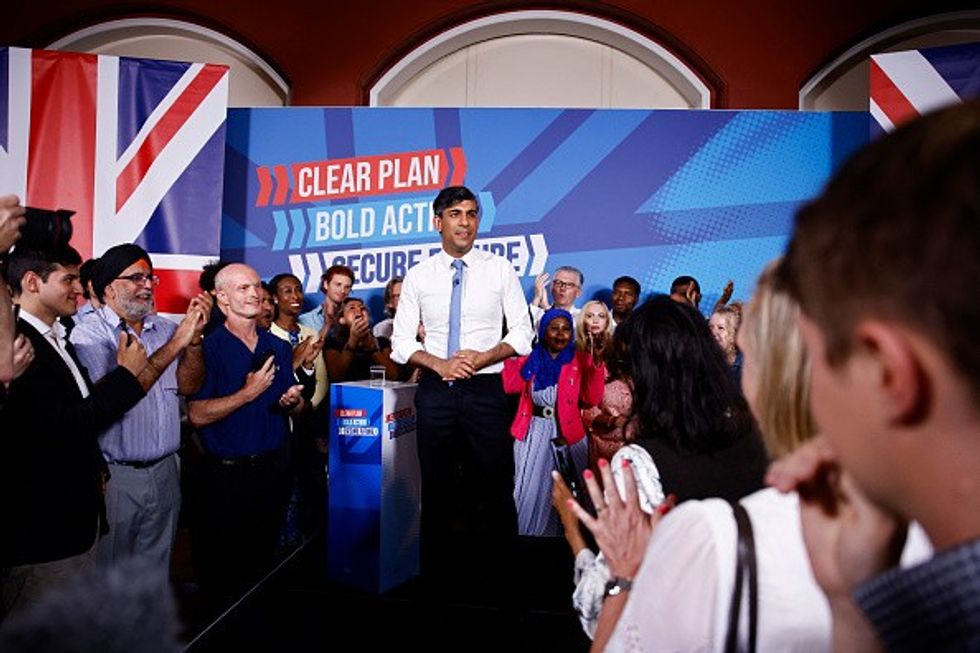
“With your vote, I will take further bold action in the next parliament, cutting taxes for workers, parents and pensioners, and helping the backbone of Britain’s economy – small businesses – to thrive.”
Concluding about contribution of Asian and Black communities in Britain, Sunak stated that he is enormously proud to be the first British Asian Prime Minister of what he believes as the most successful multi-ethnic democracy in the world.
“My grandmother came here with almost nothing. In no other country would my story be possible. And I’m proud of the Conservatives’ record on helping Asian and Black communities.
“Since 2010, employment in ethnic minority groups has gone up by 70 percent and ethnic diversity at the top of Britain’s biggest companies has also increased – 96 of the FTSE 100 companies now have at least one ethnic minority director. While there is more to do, we should celebrate these achievements and not bring down the progress our country has made.
“I will continue to work as hard as I can for you, cutting working people’s taxes too so they have more money in their pockets and growing the economy to create new opportunities. Just this year, we have cut taxes by £900 for the average worker, and my clear plan will deliver a further tax cut in the next Parliament, saving the average worker £1,350 in total, and abolish National Insurance completely for the self-employed.”
Warning the voters against Labour’s expected moves, Sunak declared that what Britain needs for the coming five years is a bold action plan.
Sunak said, “Right now, I’m focused on fighting for every vote at this election so I can continue with our clear plan to cut taxes, protect pensioners and build a more secure, more prosperous future for our children and grandchildren.
“I am working flat out in this election because I passionately believe that Britain needs the bold action our plan sets out for the next five years. Labour would raise taxes, raid pensions and take us back to square one.
“From a global pandemic to the biggest energy shock for almost half a century, Britain has been hit by a number of unprecedented challenges in the past few years. But by sticking to our clear plan, we have now turned a corner. My first priority as PM was to halve inflation and it’s now back to normal at two percent target – lower than in Europe and the US.
“Real wages are rising, Britain was the joint fastest-growing economy in the G7 in the first quarter of this year, and we have been able to cut the average worker’s taxes by £900 since January. With your vote, I will take further bold action in the next Parliament, cutting taxes for workers, parents and pensioners, and helping the backbone of Britain’s economy – small businesses – to thrive.
“In contrast, Labour offers a tax rise of £2,094, a raid on people’s pensions and more burdensome regulation on small businesses. They would take us back to square one and cannot be trusted," he said.






